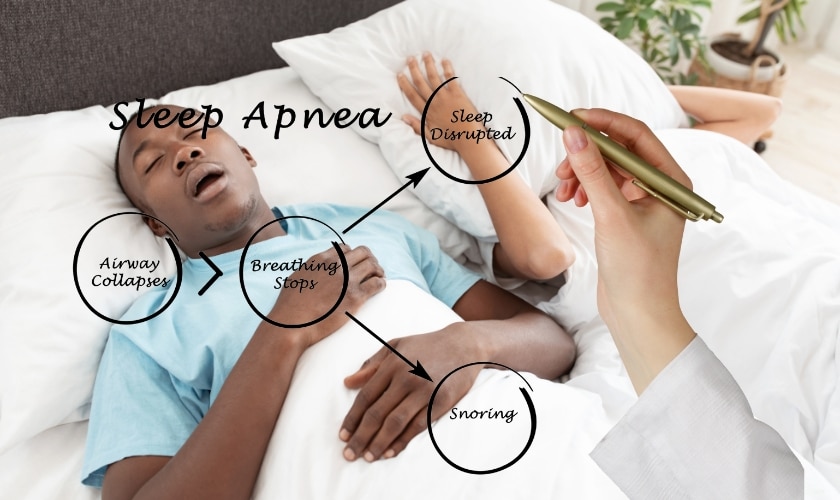
Sleep apnea, a condition characterized by interrupted breathing during sleep, can significantly impact your health and quality of life. While medical interventions are often necessary, there are numerous ways to fix sleep apnea naturally. In this blog, we will explore obstructive sleep apnea, methods to detect it at home, and various natural remedies to help you breathe easier and sleep better.
What is Obstructive Sleep Apnea?
Obstructive Sleep Apnea (OSA) is the most common form of sleep apnea, affecting millions of people worldwide. OSA occurs when the muscles in the back of your throat relax excessively, causing a blockage of the airway. This obstruction can lead to repeated pauses in breathing, often resulting in snoring, gasping, or choking sounds during sleep. These interruptions can occur multiple times per hour, fragmenting sleep and reducing oxygen levels in the blood.
Symptoms of Obstructive Sleep Apnea
Recognizing the symptoms of OSA is crucial for seeking appropriate treatment. Common symptoms include:
- Loud, chronic snoring
- Episodes of stopped breathing observed by another person
- Gasping or choking during sleep
- Excessive daytime sleepiness
- Difficulty concentrating
- Morning headaches
- Irritability and mood changes
- Dry mouth or sore throat upon waking
OSA is linked to several health complications, including hypertension, heart disease, stroke, diabetes, and increased risk of accidents due to daytime sleepiness. Therefore, addressing sleep apnea is essential for overall well-being.
How to Detect Sleep Apnea at Home
Detecting sleep apnea typically involves a visit to a sleep specialist for an overnight sleep study, known as polysomnography. However, there are several ways to detect sleep apnea symptoms at home, which can prompt a more formal diagnosis.
1. Self-Monitoring and Sleep Journals
One of the simplest methods to detect sleep apnea is by keeping a sleep journal. Note the following details:
- Bedtime and wake-up time
- How many times do you wake up at night?
- Any snoring or breathing difficulties reported by a bed partner
- Daytime energy levels and mood
2. Smartphone Apps and Wearable Devices
Technology has made it easier to monitor sleep patterns. Several smartphone apps and wearable devices track your sleep quality, breathing, and movements. These tools can provide valuable insights into your sleep habits and indicate potential sleep apnea.
3. Video Recording
Another effective method is setting up a video camera to record yourself sleeping. Review the footage for signs of interrupted breathing, snoring, gasping, or restless movements.
4. Home Sleep Apnea Tests (HSAT)
Home Sleep Apnea Tests (HSAT) are devices prescribed by doctors that you can use in the comfort of your home. HSAT monitors breathing patterns, oxygen levels, and heart rate to detect sleep apnea. Although not as comprehensive as polysomnography, HSAT can provide enough information for a preliminary diagnosis.
How Do You Fix Sleep Apnea Naturally?
While Continuous Positive Airway Pressure (CPAP) therapy is the gold standard for treating OSA, some individuals may prefer to explore natural remedies. Here are several effective strategies to fix sleep apnea naturally:
1. Weight Management
Maintaining a healthy weight is crucial for managing sleep apnea. Excess weight, especially around the neck, can increase the likelihood of airway obstruction. Studies show that even a modest weight loss can significantly reduce the severity of sleep apnea. A balanced diet combined with regular exercise is essential for weight management and overall health.
2. Positional Therapy
Sleep position plays a significant role in sleep apnea. Sleeping on your back can cause the tongue and soft tissues to collapse into the airway. Positional therapy encourages sleeping on your side, which can help keep the airway open. Using body pillows or specialized devices like wedge pillows can facilitate side sleeping.
3. Throat and Tongue Exercises
Strengthening the muscles around the airway can help reduce sleep apnea symptoms. Throat and tongue exercises, also known as oropharyngeal exercises, target the muscles of the mouth, tongue, and upper throat. These exercises include:
- Repeatedly sliding the tongue backward along the roof of the mouth.
- Pressing the tongue to the roof of the mouth and holding it for several seconds.
- Pronouncing vowels and certain consonant combinations to engage throat muscles.
Research indicates that regular practice of these exercises can reduce the severity of sleep apnea and improve sleep quality.
4. Avoiding Alcohol and Sedatives
Alcohol and sedatives relax the muscles of the throat, increasing the risk of airway obstruction. Limiting or avoiding these substances, especially before bedtime, can help reduce sleep apnea episodes.
5. Establishing a Sleep Routine
Creating a consistent sleep routine can improve sleep quality and reduce sleep apnea symptoms. This includes:
- Observing a regular bedtime and wake-up time.
- Establishing a calming evening ritual, like reading a book or having a warm bath.
- Making sure your sleeping space is quiet, dark, and comfortable.
6. Nasal Decongestion
Nasal congestion can exacerbate sleep apnea by making it harder to breathe through your nose. Using saline sprays, nasal strips, or a neti pot can help clear nasal passages and improve airflow.
7. Herbal Remedies and Supplements
Certain herbal remedies and supplements may help reduce sleep apnea symptoms. These include:
- Melatonin: A natural hormone that regulates sleep-wake cycles, melatonin supplements can help improve sleep quality.
- Magnesium: This mineral promotes muscle relaxation and can improve sleep.
- Valerian Root: Known for its sedative properties, valerian root may help improve sleep quality.
8. Yoga and Breathing Exercises
Practicing yoga and breathing exercises can strengthen respiratory muscles and improve lung function. Techniques like diaphragmatic breathing and alternate nostril breathing can enhance airway stability and reduce sleep apnea symptoms.
9. Acupuncture
In acupuncture, a kind of traditional Chinese medicine, tiny needles are inserted into predetermined body locations. Some studies suggest that acupuncture may help reduce the severity of sleep apnea by promoting muscle relaxation and improving sleep quality.
10. Essential Oils
Aromatherapy with essential oils like lavender, peppermint, and eucalyptus can promote relaxation and improve sleep quality. These oils can be used in diffusers or applied topically with a carrier oil before bedtime.
A Bottom Line
Fixing sleep apnea naturally involves a multifaceted approach that includes lifestyle changes, positional therapy, exercises, and holistic remedies. While these natural methods can significantly improve symptoms, it is essential to consult with a healthcare provider for a comprehensive diagnosis and treatment plan. Combining natural remedies with medical interventions, when necessary, can lead to better sleep, improved health, and enhanced quality of life.
Sleep apnea is a serious condition that requires attention and management. By exploring and incorporating natural remedies into your routine, you can take proactive steps toward better sleep and overall well-being. Prioritize your sleep health, and remember that small changes can make a significant difference.
